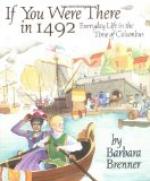Colonial department.
In the conduct, however, of Ferdinand and Isabella towards the Indians there was nothing equivocal, but all that they did showed the tenderness and religious care of these monarchs for their new subjects. A special department for the control of colonial affairs was placed under the charge of Juan de Fonseca, an eminent ecclesiastic who was high in the royal favour, and on whom was eventually conferred the title of Patriarch of the Indies. But, unfortunately for the poor savages whose fate he was now to influence so largely, Fonseca’s character had in it but little of the mild and forbearing spirit of Christianity. A shrewd man of business, a hard task-master, an implacable enemy, he displayed, during his long administration of Indian affairs, all the qualities of an unscrupulous tyrant, and was instrumental in inflicting on the islanders keener miseries than ever have been brought by conqueror upon a subject race.
Home of the gold.
Jealous of the rivalry of Portugal, the sovereigns took every means of hastening the preparations for a second voyage to be undertaken by the admiral. Twelve caravels and five smaller vessels were made ready, and were laden with horses and other animals, and with plants, seeds, and agricultural implements for the cultivation of the new countries. Artificers of various trades were engaged, and a quantity of merchandize and gaudy trifles, fit for bartering with the natives, were placed on board. There was no need to press men into the service now; volunteers for the expedition were only too numerous. The fever for discovery was universal. Columbus was confident that he had been on the outskirts of Cathay, and that the scriptural land of Havilah, the home of gold, was not far off. Untold riches were to be acquired, and probably there was not one of the 1500 persons who took ship in the squadron that did not anticipate a prodigious fortune as the reward of the voyage. Nor was one of the great objects of these discoveries uncared for. Twelve missionaries, eager to enlighten the spiritual darkness of the western lands, were placed under the charge of Bernard Buil, a Benedictine monk, who was specially appointed by the Pope, in order to ensure an authorized teaching of the faith, to superintend the religious education of the Indians.
The admiral’s instructions.
The instructions to Columbus, dated the 29th of May, 1493, are the first strokes upon that obdurate mass of colonial difficulty which at last, by incessant working of great princes, great churchmen, and great statesmen, was eventually to be hammered into some righteous form of wisdom and of mercy. In the course of these instructions, the admiral is ordered to labour in all possible ways to bring the dwellers in the Indies to a knowledge of the Holy Catholic Faith. And that this may the more easily be done, all the armada is to be charged to deal “lovingly” with the Indians; the admiral is to make them presents, and to “honour them much;” and if by chance any person or persons should treat the Indians ill, in any manner whatever, the admiral is to chastise such ill-doers severely.




